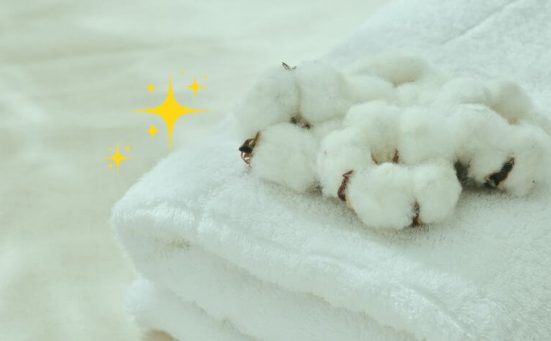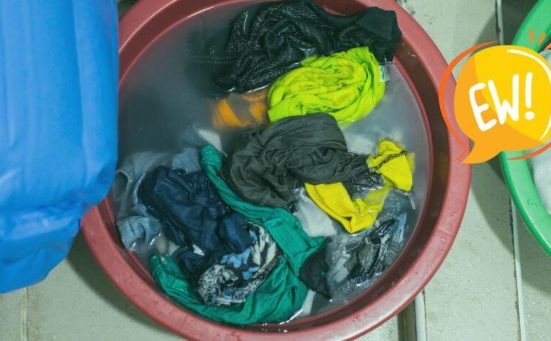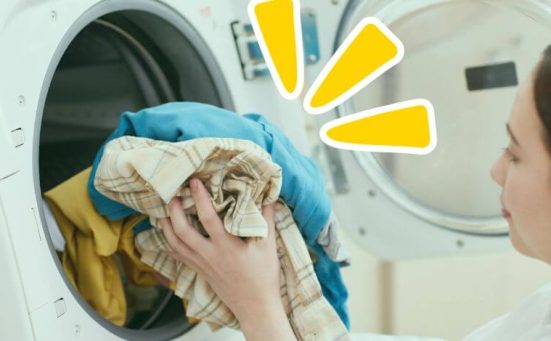
What Happens If You Wash Clothes Without Detergent?
Whether you’ve forgotten to add detergent to your washer, you’re thinking of the environment or you’ve simply run out, you’re going to want to know what happens if you don’t use detergent to wash your clothes.
Surface dirt like dust etc, will be removed without detergent but any ingrained stain, oil, grease or even sweat stains will remain. Plus the clothes won’t smell too good either.
However there’s much more you need to know about cleaning clothes without detergent, read on to find out.
What Is Detergent & How Does It Work?
Laundry detergents are made from a mixture of various chemicals. Some are called surfactants and they stick to dirt and create molecules all round it. The dirt is then lifted from the fabric with water.
This is because the surfactants bond to dirt at one end and to water at the other. As the water and detergent are moved around the drum, more surfactants attach to more dirt before the dirt is loosened from the fabric and surrounded by water molecules.
The dirt encased in molecules is then rinsed out of the machine and sent down the drain.
Without the detergent, those dirt, grease and sweat stains will stay on the fabric and in some cases, washing them without using detergent can actually bind the stains deeper.
This is because one of the other chemicals in detergents softens the water to remove minerals like calcium and magnesium which are found in what’s known as “hard water”.
Almost ⅔ of the UK has hard water which means most of the country is at risk of some damage to their laundry as a result of hard water. Damage to fabrics from hard water include; colour fade and weakening of the fibres which can cause tearing.
Another component in detergent is the chemical that creates the fragrance. This prevents the clothes from smelling of sweat (or worse) after being washed.
Then there are other chemicals designed to strengthen the surfactants and keep them working whatever the temperature of the water or its hardness.
How Are Clothes Affected If You Don’t Use Detergent?
What happens to clothes if you don’t use detergent depends on several factors including;
- The temperature of the water
In some cases hot water is enough to remove dirt and some stains, even oils and grease can sometimes be removed just by using hot water. The problem can be that the fabric cannot withstand the high temperatures needed to remove stubborn stains. - Any residual detergent from a previous wash
If the clothes weren’t rinsed thoroughly in their last wash, or the machine itself has a build up of detergent, this residue can be sufficient to remove many stains. However, this is not always the case. - The hardness of the water
Hard water can dry leaving a white residue on clothes that stains them and looks like sweat or salt staining. Detergents contain water softeners to combat hard water and leave clothes looking stain free. - How smelly the clothes are
If your clothes smell of sweat or any other strong odour, washing with water is not enough to remove the bacteria that causes the smell. In some cases, the odour gets stronger as it dries if it hasn’t been successfully removed during the washing process.
Is Laundry Detergent Bad For The Washing Machine?
If you use too much detergent in your washer, it can lead to the pipes etc becoming clogged with dried detergent. However, not using enough can cause damage to the machine.
With around 60% of the UK affected by hard water, calcium build up is a very real threat. The mineral deposits can cause various components of your machine to not work as well as they should.
This will eventually lead to your washer breaking down. Modern detergents contain a water softening agent that physically removes many of these harmful minerals from the water and prevents them from causing any damage.
With that said, many of these chemicals only work effectively at higher temperatures. Which is why you need to run a hot wash every 3 or 4 washes.
What Are The Pros & Cons Of Washing Laundry Without Using Detergent?

Let’s take a quick look at the benefits and disadvantages of not using detergent in your washing machine.
The Benefits
The main benefits of not using detergent when washing clothes in the washer include;
- It reduces your impact on the environment
If you don’t use detergent when washing clothes in your machine, then no detergent can be drained into the waste water which all eventually ends up in our waterways. - It can make clothes last longer
Using too much detergent or a detergent that’s too strong can cause some fabrics to weaken and become damaged. - It can remove water soluble stains
Some dirt stains will easily be removed with just water. This means some of the stains in your clothes can be removed just using water and no detergent. - It saves money
Laundry detergent, like everything else nowadays, isn’t cheap. Even supermarket own brands are quite expensive. Not using any detergent will save on your shopping expenses.
The Disadvantages
The main disadvantages to not using detergent in your washer include;
- Your laundry could become smelly
Detergents contain chemicals that add fragrance to your clothes, without using detergent, your clothes will still smell of whatever they smelled before being washed. In many cases that smell could be greater once the clothes have dried. - Your washing machine could become damaged
This is especially true if you live in a hard water area. The minerals that cause hard water can coat many of the working parts of your machine. This can cause the machine to break down. Detergents contain chemicals to combat these minerals and therefore keep the washer running for longer. - Your clothes won’t get thoroughly cleaned
Without the use of a detergent, many stains will remain in your clothes. Many types of stains can only be removed with the help of surfactants found in laundry detergents.
Can You Add Detergent Once The Machine Has Started?
Whether you can add detergent to the wash once the machine has started depends on how far along in the cycle the machine has reached and the type of machine you own.
Front Loaders (popular in UK)
Once a front loader has started, you can’t open the door to add detergent. It is possible to add detergent into the dispenser drawer but only if the drum isn’t full of water.
The drum fills with water that passes over the dispenser drawers so any detergent will be flushed through with the water and then reaches the laundry.
However, if the drum is already full of water during the wash cycle, the next time the water flows it’s during the rinse cycle. If you add detergent to the rinse cycle, the detergent won’t get rinsed out leaving the clothes coated in detergent which will stain the clothes as they dry.
Top Loaders (popular in the USA & Canada)
Top loaders are different as you can usually lift the lid and add detergent at any point. However, the same problems will apply, adding detergent too late in the cycle will lead to it remaining on the clothes at the end of the cycle.
Are There Any Natural Alternatives To Laundry Detergents?
If you have decided that you don’t want to be contributing to the already steady stream of chemicals that are finding their way into our water courses, you might be interested in some of the following natural alternatives.
The benefits of using natural detergents is they don’t contain any of the harmful chemicals that can cause skin irritations, pollute our rivers and streams or cause damage to certain fabrics. Natural cleaning agents for washing clothes include;
Soap Nuts
- Ecozone Soap Nuts: Naturally and sustainably sourced. Organic, allergy-friendly, economical, great value and highly effective nuts are an ideal alternative to laundry detergent, liquid, powder or pods
- 100% organic, hypoallergenic, biodegradable pellets: Encased in fully compostable plant-based wrap. Easy to use, removes dirt and stains even at cold 30° wash; outstanding clean for whites or colours
Also known as soap berries, soap nuts contain saponin which is a natural surfactant. They are 100% organic, hypoallergenic and biodegradable.
Bicarbonate Of Soda
- ECO-FRIENDLY: Sodium Bicarbonate / Baking Soda is one of the top eco-friendly , safe and inexpensive cleaning, baking and household products available.
- CLEANING: Baking Soda is particularly useful in food preparation, cleaning surfaces, ovens, grills, microwaves and fridges whilst also deodorising and freshening without leaving any harsh chemical smells.
1 cup of bicarbonate of soda added to the wash will naturally deodorise your laundry as well as softening the water.
White Vinegar
- Premium Quality: Our white vinegar is made from high-quality ingredients to ensure you're getting the best product for your needs.
- Versatile Cleaning: From kitchens to bathrooms, our 5-liter white vinegar can be used as an effective and natural cleaner, tackling tough stains and grease.
1 cup of white vinegar will remove stains from your laundry without adding any harmful chemicals to the waterways. You do need to take some precautions however, as using too much vinegar can, over time damage rubber hoses, door seals etc.
What Should You Never Use To Wash Clothes In A Washing Machine?
There are a few cleaning products that you might think would be OK to use in the washer. Many might be safe however you should never use any of the following to wash clothes in a washing machine;
- Washing up liquid
- Shampoo
- Liquid hand soap
All of the above can have a detrimental effect on your washing machine. Even in small doses they can produce way too many suds that can cause irreparable damage to your machine.
Can You Wash Clothes Without Detergent In The Washer?
Although it is possible to wash clothes in a washing machine without using detergent, the results can be something of a disappointment. Whilst it might be OK for dusty items to be washed without detergent, it’s not a good idea long term.
The clothes will not be cleaned or disinfected properly and due to hard water, the machine could become damaged too.
SEE ALSO: Washing Machine Drawer Compartments Explained (with drawer symbols)
Frequently Asked Questions
While washing your clothes using just water is likely to remove surface dirt and dust, it will not remove stains, odours or bacteria.
If you don’t put laundry detergent in your washing machine, you will likely remove any dust or water soluble stains but any grease, oils, sweat, germs and bacteria will remain. This will leave your clothes dirty and smelly after being washed.
You need detergent to wash clothes to remove stains, germs, bacteria and odours. The chemicals contained in detergents also help to combat the effects of hard water on your laundry.
Also, follow us on Pinterest ...






